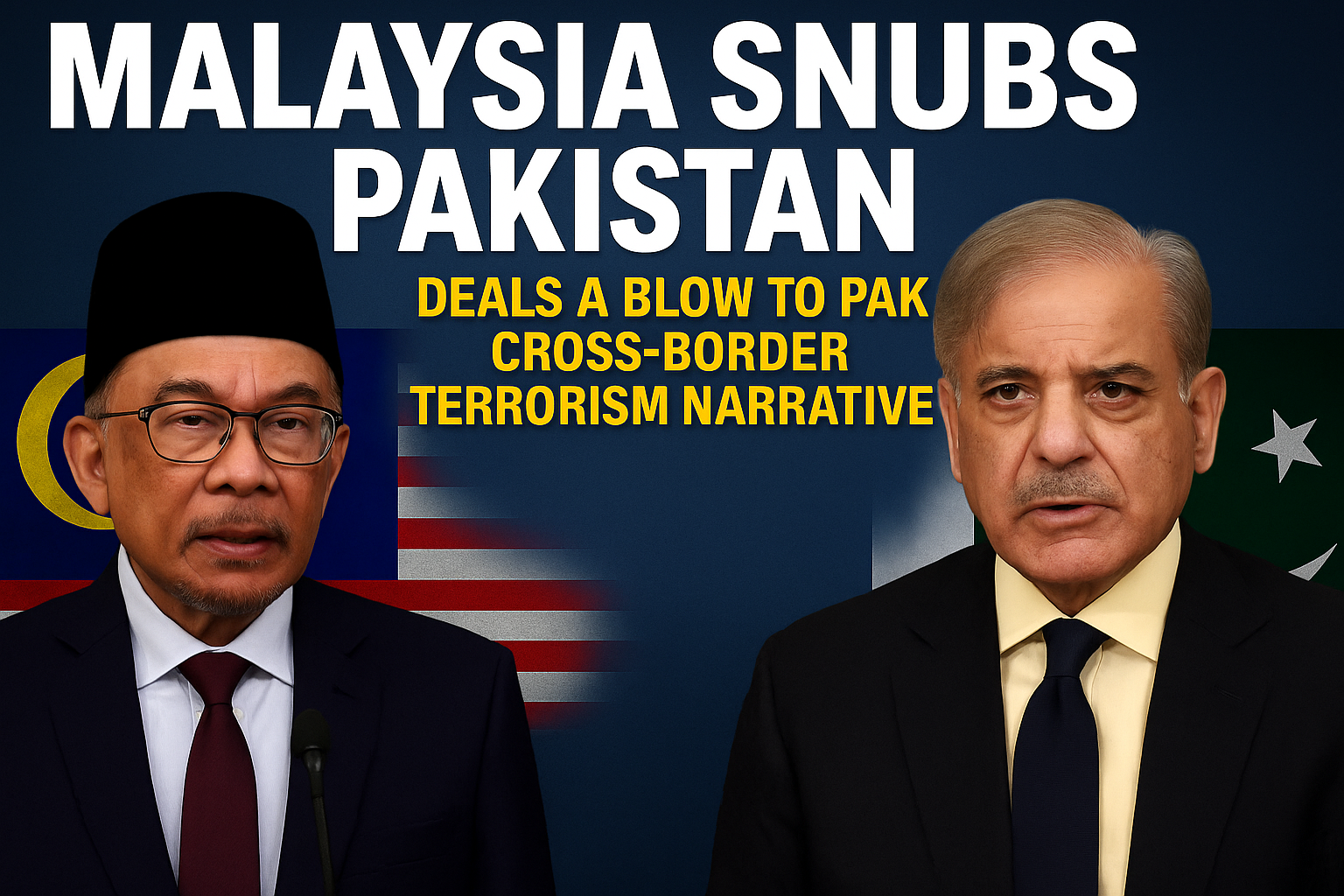Malaysia’s Diplomatic Snub to Pakistan: A Turning Point in South Asia’s Geopolitical Narrative

In a dramatic diplomatic episode that has gone largely underreported in mainstream media, Pakistan faced a significant setback not from a Western power, but from a Muslim-majority country it once considered a steadfast ally on the Kashmir issue: Malaysia. This development not only exposes Pakistan’s declining global influence but also reaffirms the rise of India’s mature and assertive diplomacy. The attempted sabotage of India’s outreach in Kuala Lumpur, and Malaysia’s outright refusal to bend, marks a critical inflection point in South Asian geopolitics.
Let’s dissect what transpired, why it matters, and how Pakistan’s traditional religious diplomacy is now hitting a geopolitical wall.
The Background: Terror, Diplomacy, and the Search for Truth
After the brutal Pahalgam Tera attack, which claimed innocent lives, India launched Operation Sindoor, a calibrated military operation targeting terror infrastructure in Pakistan & Pakistan occupied Kashmir. This was not a knee-jerk reaction but a carefully executed move designed to neutralize cross-border terrorism while avoiding civilian casualties.
India, keen on setting the record straight globally, initiated an all-party diplomatic offensive. The objective was clear:
- Expose Pakistan’s double standards on terrorism.
- Challenge the propaganda surrounding Kashmir.
- Build a global consensus against state-sponsored terror.
One of the most consequential visits was to Malaysia, where the Indian delegation’s reception stood in stark contrast to Pakistan’s expectations and its behind-the-scenes manipulations.
India’s Multi-Party Diplomacy in Action
The Malaysian leg of the diplomatic campaign was led by JD(U) MP Sanjay Jha and comprised representatives across the political spectrum:
- Salman Khurshid (Congress)
- Abhishek Banerjee (TMC)
- John Brittas (CPI-M)
- Senior BJP MPs
- Ambassador Mohan Kumar, a seasoned diplomat
This bipartisan representation projected a powerful image,India speaking in one voice on national security.
In Malaysia, the delegation:
- Condemned the Pahalgam attack and named Pakistan as the state sponsor of terrorism.
- Clarified that Operation Sindhur was targeted only at terror camps, not civilians.
- Emphasized the return of normalcy in Jammu & Kashmir, backed by socio-economic data.
- Urged Malaysia to support India’s case at FATF to reinstate Pakistan on the grey list.
- Reaffirmed India’s democratic strength and political unity against terrorism.
Pakistan’s Desperate Gambit and Malaysia’s Calm Defiance
Sensing the threat to its narrative, Pakistan’s embassy in Kuala Lumpur panicked.
Behind closed doors, it made a desperate appeal to the Malaysian government, demanding that:
- India’s public engagements be cancelled.
- Malaysia side with Pakistan in the name of “Islamic brotherhood.”
- The Indian delegation be labeled as promoting “anti-Muslim aggression.”
They argued that Malaysia had previously supported Pakistan on Article 370 and Kashmir, and that it should remain loyal.
But Pakistan’s playbook failed spectacularly.
Malaysia’s Response: A Diplomatic Slap
Malaysia rejected every single demand from Pakistan. They allowed India’s delegation full access to their meetings and forums, uninterrupted. This wasn’t just passive neutrality, it was an active dismissal of Pakistan’s religious pressure tactics.
This moment was telling. Malaysia, once under Mahathir Mohamad, had openly criticized India’s Kashmir policy. But under PM Anwar Ibrahim, Malaysia’s approach has matured. Today, Malaysia prioritizes:
- Economic diplomacy over ideological alignment
- Balanced relations with both India and the Muslim world
- Strategic autonomy rather than bloc politics
This marks a strategic shift not just in Malaysia’s foreign policy, but in how the Islamic world views South Asia.
The Crumbling of Pakistan’s Religious Diplomacy
This is not an isolated failure. Let’s contextualize it:
- OIC 2019: India was invited as guest-of-honor despite Pakistan’s opposition.
- OIC Parliamentary Union 2024 (Jakarta): Pakistan tried pushing anti-India statements; Indonesia, Egypt, and Bahrain blocked them.
- FATF: Pakistan remains under global scrutiny for terror financing, and India’s sustained lobbying has worked.
- UN & EU: India has successfully shifted global discourse from “Kashmir” to “Pakistan-sponsored terror.”
The old Pakistani tactic leveraging Islamic solidarity has lost global traction. Muslim-majority nations now increasingly act in their national interest, not in ideological lockstep with Pakistan.
Why Malaysia’s Rejection Matters
- It demolishes Pakistan’s self-proclaimed leadership of the Islamic world.
When even an Islamic ally says “no,” Pakistan’s religious card is nullified. - It boosts India’s credibility as a responsible regional power.
India didn’t send a partisan delegation but a unified national representation. India came with facts, not slogans. - It reframes the Kashmir narrative.
The world now views Kashmir as a governance issue, not a religious one. The focus has shifted to terrorism, law and order, and economic revival. - It validates India’s new diplomacy confident, bipartisan, and globally engaged.
Conclusion: A Diplomatic Win, A Strategic Shift
Pakistan’s attempt to play the religion card in Malaysia boomeranged. Far from isolating India, it isolated itself. The Islamic world is moving on, and Pakistan’s fixation on Kashmir is beginning to sound like a broken record on the global stage.
Meanwhile, India’s ability to rally support across party lines, speak in one voice, and present evidence-backed diplomacy has made it a rising pole of stability in the region.
Malaysia’s decision not only embarrasses Pakistan, it signals to the world that religious sentiment can no longer mask terror complicity. It shows that Islamic nations will no longer be swayed by empty rhetoric, especially when their national interest lies in partnering with an emerging economic powerhouse like India.
Pakistan has long weaponized victimhood. But the world is beginning to ask: victim of what or victim of its own duplicity?
The tide is turning. And India is leading it.